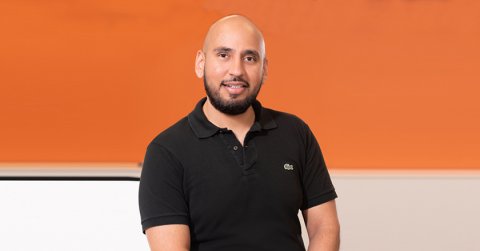
Hozefa Saylawala, Middle East Director – Zebra Technologies outlines how the company uses new and emerging technologies to solve workforce management issues and challenges faced by customers.
Can you outline to our readers how your company has harnessed cutting-edge technologies to transform how you conduct your day-to-day operations to deliver the ‘experience’ that your customers, end-users, and partners’ demand in the experience economy?
The rapid pace of digitisation across industries continues and businesses need solutions to help them modernise, automate and meet demand. The on-demand economy, ecommerce, labour hiring and retention are driving the need for technology solutions, presenting Zebra and partners with the challenges faced by customers.
Zebra’s solutions support companies looking to modernise their operations and better equip their front-line workers through a ‘sense, analyse, act’ approach, helping connect every front-line worker and asset at the edge, making them visible, connected and fully optimised. Zebra’s portfolio of hardware, software, services and solutions digitise and automate workflows across a range of industries.
Zebra invests 10% of global revenue into R&D and Zebra and partners have new, useful solutions to bring to customers, including Machine Vision and AI-powered software for demand forecasting, workforce and task management. Zebra has also launched a series of new specialisations within its partner ecosystem, including location and tracking, software-as-a-service, and advanced Machine Vision.
OpenAI and ChatGPT are all the rage, and these new AI integrations have been tipped to fundamentally reshape all major industries as we know them. What is your view on OpenAI, are you excited by the new opportunities that it will present, or do you think more regulation is needed to control its impact on society?
Zebra’s portfolio features a arrange of AI to support customers with automation, analytics, and inspection, for greater levels of accuracy, speed, quality and compliance in manufacturing, for example.
There have been a lot of discussions about Artificial Intelligence (AI), thanks to ChatGPT’s ability to provide a human interface. People want to know if the hype represents reality. Fear among the public is spurring politicians to regulate the technology.
Some of the latest generative AI solutions have problems. But AI is doing a lot of good in the world today. Manufacturers and retailers use adaptive AI to forecast demand and plan inventory, especially CPG (consumer packaged goods) companies. AI-powered machine vision assists with detailed quality inspections of everything from medications to automotive and electronic parts coming off the manufacturing line.
Many essential workers are supported by trustworthy adaptive AI – an app on a wearable or handheld mobile computer, in a business’s inventory, logistics and/or e-commerce information system, or even in the cloud tied to an industrial automation system.
As the number of smart devices – IoT physical objects – at the edge of networks continues to grow, we know responsible and ethical AI is going to become necessary to business. The concerns around generative AI extend to all AI, and we must consider the implications of new AI use cases. Continuous evaluation and refinement of responsible AI methodology in terms of ethics, development and deployment is needed, supported by evolved processes, principles, tools and training while ensuring consistency and compliance.
There has been a swathe of digital and cloud transformation projects in the Middle East over the last 3-5 years. However, many have struggled with the demands of cloud transformation, especially legacy-heavy players. What are the key processes that enterprises need to adopt to ensure a successful transformation journey?
The regional end-customer buyer and influencer base is shifting from the IT department to broader business operations management and more senior executives, as the regional enterprise business model transforms with increasing adoption of digital. As industries transform, the channel also has to adapt and focus on customer relationships and outcomes, to support cloud transformation.
Zebra’s products are enriched with software on-device and in the cloud to provide customers and partners the tools they need to put their data to work, allowing for higher levels of security and manageability and analytics that can elevate the performance of their business. Zebra’s software-as-a-service portfolio includes Workforce and Task Management, AI-powered demand forecasting, Zebra Prescriptive Analytics, and Aurora machine vision with deep learning.
The cloud-based Zebra Savanna data platform aggregates and analyses data from edge devices to reveal actionable workflow insights, and power next-gen applications and solutions, while Zebra Data Services operates as a cloud-based capability designed to assist software developers and ISVs to build applications.
In your expert opinion, what do you view as the biggest problem facing enterprises in the IT and technology industry across the Middle East?
Enterprise solutions require a collaborative go-to-market approach, in order to provide a total solution for customers. That starts with understanding a customer’s challenge or opportunity, then creating a tailored solution. Aligning with like-minded complementary providers and channel partners is fundamental to Zebra which is coupling its market-leading portfolio with partner applications, to help end user customers make business-critical decisions.
This supplement is titled Tech Vision, so with that in mind, what do you think the future holds for the IT and tech sector across the Middle East, what will be the key trends and technologies that will really champion change over the next ‘digital decade’?
Sustainability is the key driver of technology adoption and change. For example, warehouse decision-makers are choosing solutions based on their ability to help them build sustainable operations, driven largely by regulations, energy costs or shortages along with customer, worker and investor expectations. 78% of European warehouse decision-makers (77% globally) are focused on reducing emissions and waste while eight in ten warehouse decision-makers say it’s important their warehouse technology solutions maximise battery life. Beyond their own operations, 81% of warehouse decision-makers also say it’s important that technology vendors have sustainability measures in place for running their businesses.
Zebra is always innovating via R&D and acquisitions to enhance the portfolio to meet customer expectations and needs and support their automation and digitisation journeys.
In terms of technologies, we see Fixed Industrial Scanning and Machine Vision (MV) solutions helping improve quality in manufacturing, warehouse and logistics environments. Reducing complexity and costs is a priority and Zebra Aurora is designed to drive efficiency and productivity through advanced industrial automation processes.





